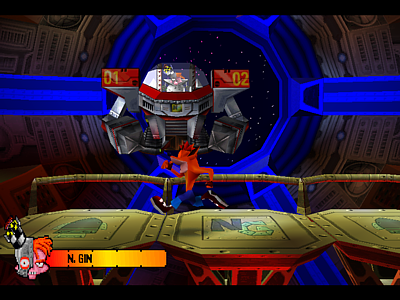
Crash Bandicoot 2: Cortex Strikes Back (1997 - Playstation) 
Crash Bandicoot 2 is very similar to the first game in almost all respects - control is identical, except that Crash now has a few new moves. The on-rails 3D (and sometimes sidescrolling) gameplay is virtually unchanged, right down to having similarly-themed levels: jungles with pits and giant rolling stone wheels, chase scenes where Crash runs towards the camera, industrial/factory levels, rivers, levels where the lights go out, and the hog-riding levels, only now you're on a polar bear cub instead of a boar. However, the suspension bridges have been axed in favor of ice levels. And, of course, the same high-level quality of graphics (even if some of them look lifted directly from the first game).
Where it differs is that the focus on getting all the crates and secret gems is stronger. While there were a few in the original game you'd likely to resort to a FAQ to figure out, it's quite obvious Crash 2 was made during the height of strategy guide popularity - you might find yourself checking a walkthrough much more often if you want to get 100%.
Stages are longer than the original game, but checkpoints are more frequent and you can keep all the crates you've gotten up to a checkpoint. While it might seem like a compromise, it's not a bad thing. I still burned through extra lives like crazy trying to beat some stages and earn the harder gems.
The opening cinema really pimps Crash's new jetpack, but I personally found those stages to be the worst in the game, and it's annoying that the final boss is fought that way (though, once again, the boss fights are the weakest part, just like Crash 1.) The plot is further proof for my theory that Crash is a reckless psycho. Yeah, he cares about saving his girlfriend, but at what cost? Helping Dr. NeoCortex nearly destroy the world? Bumping off every penguin, turtle, and walrus that isn't actively bothering him but just happens to be in his way? And if you lose to NeoCortex, he escapes through a warp into space, but if you win...well, he still escapes through a warp into space. I guess the point is just to piss him off first.
Rating: 4/5


Flying Warriors (1991 - NES)
Like Flying Dragon, Flying Warriors is part of Culture Brain's Hiryu No Ken series, and though it shares many of the same elements, it's not a direct sequel. It's more of a remake with a new main character, a more serious look (though it still has some cartoonish jokes), and more plot elements. Rick Stalker, like Ryuuhi before him, still goes to tournaments, fights Tusk Soldiers, and is still trying to build the Mandara talisman, but now there's a whole new plot to resurrect a demon that sends Rick to places Ryuuhi never went, such as the South American jungle and an alternate dimension.
In many ways, this game is greatly enhanced over Flying Dragon - The RPG elements are stronger as you now have exploration, party members, experience building, an inventory/item usage system, and even a couple of menu-driven boss battles. But despite these upgrades, its shortcomings nip constantly at your heels. The graphics are a definite improvement, but it repeats the same cave settings a lot. It has an even more kickass soundtrack, but it gets a bit tiring when the main theme completely takes over every area in the entire chapter upon completing a certain goal. The story has more to it, but it's a total nonsensical mess - Why does Peru hold a martial arts tournament in Hong Kong to investigate a fog? Why is the leader of an ancient cult of shadow warriors a 12-year-old American kid?
The Master Control setup, which makes the controls identical to Flying Dragon, is buggy and the game is unfinishable on the Expert difficulty setting with it, due to a quirk where you cannot block an enemy's spell if the circle appears on your midsection. The Standard Control setting is stripped down and makes the game playable, but the ability to jump is assigned to both the A button and Up, meaning that if you want to aim high, you have to jump first and hold it down. The jump action was probably supposed to have been removed from Up, but wasn't. And for more proof the game is unfinished, try playing the Tournament mode from the main menu - it's essentially one humongous glitch.
So, while I spent a lot of time with Flying Warriors, maybe even more than I did with Flying Dragon, I can't strongly recommend it. It needed more work to be fully realized. Flying Dragon is a unique little novelty game, but novelty tends to wear out its welcome when it's integrated into a game that has glaring problems.
Rating: 3/5



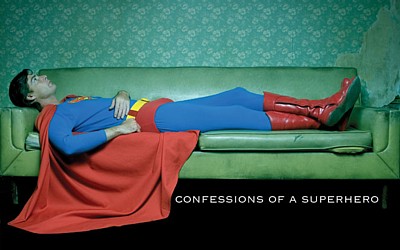
Confessions of a Superhero (2007 - Streaming Video)
I really don't know what to think of these superhero-themed documentaries except that maybe I should stop watching them. Confessions follows the "adventures" of four people who tried to become actors, but because of how difficult that is, they end up dressing as superheroes on Hollywood Boulevard and posing with people for photographs. They don't get paid for this, except in voluntary tips.
This was maybe fascinating for about 20 minutes, but the movie is over 90 minutes long. The Superman guy's collection was admittedly quite impressive. But when they start talking about their lives outside the costumes, it's not much different from the average person on your street. And I'm pretty sure the Batman guy was completely making up that stuff about his past life in the mafia, which the Hulk guy seemed to think, too, so it's even more pointless.
Fans of this film that I've come across are generally of the "pointing and laughing at losers is funny" variety. I guess if you fit that bill, then this film is for you. I found most of it boring.
Oh, and I had a wonderful coincidence here. The Superman guy thinks he's the son of actress Sandy Dennis (her family denies it). Sandy Dennis played the wife in the 1970 The Out-of-Towners, and they even show clips from it. It's great when a movie you're not enjoying very much directly references another movie you just saw that you didn't enjoy very much, either.
Rating: 2/5
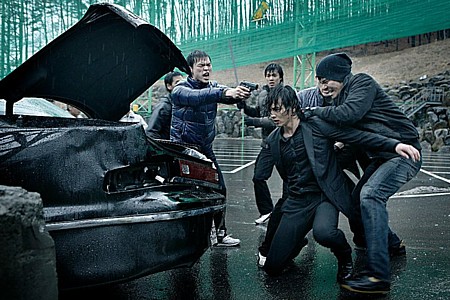
The Man From Nowhere (2010 - Streaming Video)
I hope it's not politically incorrect to say this, but this South Korean martial arts flick is essentially a live-action anime. I don't know if it's possible to deny it. You know that skinny anime archetype guy with the suit or jacket and Justin Bieber haircut who wields a samurai sword and has a curved posture? Look up "anime skinny sword guy" on any image search and you'll likely be bombarded with pictures of "him". Yeah, this movie has one of those. A real one.
What surprised me is that this isn't a straight-up action movie. It's got a lot of drama, mystery, and character-building, despite that the main protagonist doesn't say much. He's a pawn shop proprietor who has a mysteriously secret past, but that doesn't stop a young girl who lives next door from making friends with him. Though he acts aloof to her presence most of the time, he is suddenly drawn into a battle against gangsters when they kidnap her because of her mother's involvement in their drug-smuggling operation.
The pacing and plot are very engaging, though may be disappointing to audiences that are expecting more action. When the action scenes do occur, they are extremely violent - I'm talking Kill Bill levels of blood and gore here. Since both appear to have taken a cue from hyper-violent anime, it makes sense.
I was a bit skeptical of the gangsters' method of smuggling drugs. It seemed awfully complicated and cumbersome considering the likelihood of it being discovered. (At some point, somebody is going to notice those machines around town are always out-of-order.) And as brutal as the movie is, I somehow doubted they were actually going to go through with the little girl's "fate" at the end, but I have no idea what really happened.
Rating: 3/5
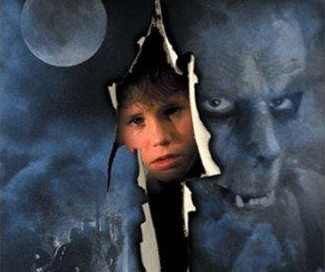
Silver Bullet (1985 - Streaming Video)
I can tell this movie was trying to be the "Big 80s Werewolf Movie" in the same sense that The Lost Boys was the "Big 80s Vampire Movie", Poltergeist was the "Big 80s Ghost Movie", The Goonies was the "Big 80s Pirate Treasure Hunt Movie", and Gremlins was the "Big 80s..um, Gremlin Movie". But, man, does it miss well below every mark. The scene where the hunters go looking for the werewolf in the fog-enshrouded forest practically turns into one of those live action cartoon scenes where the fists of brawling characters pop out of a cloud of dust.
Much of the rest is Gary Busey constantly telling the kids that there's no such thing as werewolves, despite mounting evidence to the contrary. I don't think it's generally a good idea for characters in horror movies to only realize they're in a horror movie once a werewolf (literally) lands on their head. Especially if by then, the movie is 98% or more done.
This was based on a Stephen King novella called Cycle of the Werewolf. A bit more input from him and a bit less dated 80s influence would've probably helped.
Rating: 2.5/5




The Horror Stories of Robert E. Howard
Author: Robert E. Howard; Reader: Robertson Dean
(Audiobook - 2010; Original Stories - 1925-1936)
I decided to take this audiobook out again and re-evaluate it, purely on my own consideration, and decided to bump the score up a point. I want to make it clear that no one said anything to me or pressured me to do it. When I've done things like this in the past, I always get accused of caving into the fanbase, and the internet being the way it is, I can understand why people would jump to that conclusion, but it's never been the case with me. It's a good thing I did because I must've zoned out on some parts when listening the first time, because there were a handful of stories I had no memory of.
So, here's the lowdown: Yes, I was initially startled by the racially-insensitive material to be found in a good portion of the stories, and I will not sit here and argue about what should and shouldn't offend people. But if you can forgive Howard for being a product of his time and place (he was a southerner in the era before the Civil Rights Movement) and his publisher (who insisted he write more stories based in the south), you might find some of the better stories in the book enjoyable. As I said in my previous review, it's not that they're perfect aside from politically incorrect content. Sometimes the amount of exposition is ridiculously high, and when you think about how people are in real life, it's hard to imagine some of these characters going on as long as they do, especially when they're making accusations against someone, without being interrupted.
A lot of these stories feature three particular types of monsters - octopus monsters, lizard people, and giant frogs. I guess we can thank his friendship with H.P. Lovecraft for the octopuses, but it's a little weird when the Norse God Odin turns into one. The lizard people are used so much and are all so similar and live under similar underground conditions that I wondered if they were all part of the same reoccurring race, or supposed to be different in every story. And then the giant frogs...yeah, I suppose certain species of frogs can be gross, but still... There's one story in here when the protagonist has a vision of an ancient cult performing this wild ritual where they smash a human baby against a rock, and their "god" is a giant frog on a pedestal. Talk about "one of these things is not like the others".
While I won't deny that Howard was a good storyteller, I still don't think he quite has the upper hand on Poe when it comes to horror. I'd probably be way more interested in reading his Conan books in the future, especially since I loved the first movie.
And man, does Robertson Dean have a mesmerizing voice.
Rating: 3.5/5

Katie's Kitchen 
Author: Dee Williams; Reader: Nadia May
(Audiobook - 2001; Original Book - 1999)
Much like Temporary Sanity, Katie's Kitchen is an audiobook I checked out on a whim and ended up loving almost every minute of it. Set against the backdrop of the Suffragette Movement in late 19th Century London, Katherine Carter's upscale life is suddenly flushed down the drain when her business partner dies. They ran a restaurant together, but because she was not married to him and he left no will, the business is turned over to his irresponsible and lecherous drunk brother. Catherine is forced to move to one of the poorest places in London, where she gets a new job at a seedy cafe and barely scrapes out a living. But while her financial level has taken a nosedive, her world gradually becomes a bigger place, as her resilient and persistent nature drive her through the many trials and escapades of the various characters she meets in this most unlikely of places.
Catherine, or Katie as she's eventually (accidentally) called, is a fascinating and likable character to watch grow and succeed, even if it does seem like she always wants to do the absolute best thing for the people who need her while being somewhat emotionally-detached from the situations. There are a lot of heart-wrenching situations in this book, with this being right around the time of World War I and in Docklands London where life was not always grand for everyone. But for every scene that tests your emotional mileage, there is one of hope and inspiration, and the ending is the most touching I've seen in a long time, even for someone like me who's not a mother.
Rating: 4/5
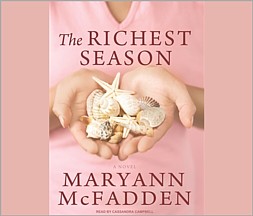
The Richest Season
Author: Maryann McFadden; Reader: Cassandra Campbell
(Audiobook - 2008; Original Book - 2006)
The moral of this book is if you're a man, don't make too much money or else your wife will run away and your kids will be profoundly ungrateful. Frank is a wealthy man whose job has provided his family with everything they ever need in life, including putting the kids through college, but they all keep complaining that they could've lived with less and he should've spent more time with his wife, Joanna. Well, maybe, but as someone who "lived with much less" growing up, I can say that it's not exactly great, either. And as Frank points out, Joanna never even tried to talk to him about how she felt before running away to live on the beach. I didn't know this at the time I borrowed the audiobook, but apparently, "wife running away to live on the beach" is a genre unto itself, as I've seen several books since with a similar plot description.
Eventually, Frank loses his job and discovers a long-forgotten "magical" woodworking talent that he uses to earn a living. Knowing how difficult it is to take a hobby and actually make money from it - especially one that you have not worked on in decades - I found this difficult to swallow.
Most of the book actually deals with Joanna's adventures in the beach community. She takes a job as a live-in housekeeper for an old lady and then later, is hired as a writer for a newspaper. These things just happen, I guess.
This book was obviously not written for rich people. It wasn't written for underprivileged people, either, because we can't read passages about the daughter getting married and moving to Paris without thinking, "Who does that?!" So, who was it written for? Women who want to fantasize about running away to the beach to leave it all behind, but know better than to actually go through with it? I suppose.
Rating: 2/5







